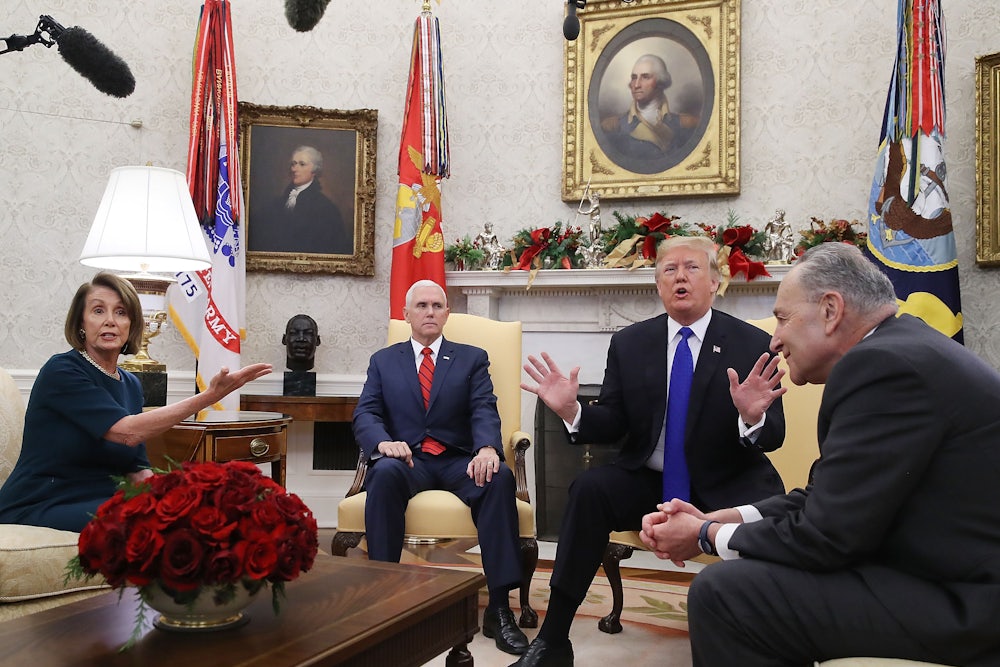On Tuesday, on live television, President Trump took ownership of a potential government shutdown over his demand for $5 billion in border wall funding. “You want to know something? I’ll take it,” Trump said, after being baited by Democratic leaders Chuck Schumer and Nancy Pelosi. “Yes, if we don’t get what we want one way or the other, whether it’s through you, through military, through anything you want to call—I will shut down the government. I am proud to shut down the government. I will take the mantle.”
.@realDonaldTrump has the Senate, the White House, and the House (for the moment) under Republican control. He has the power to keep government open – but instead, he says he’s going to shut down the government. #TrumpShutdown pic.twitter.com/Pdbo4rH0sG
— Nancy Pelosi (@NancyPelosi) December 11, 2018
Democrats and their allies spiked the football, praising the negotiating prowess of Pelosi and Schumer. “She’s damn good!” Congressman Mark Pocan told reporters, referring to Pelosi. “Personally, you don’t want to ever be on the other side of a negotiation with her, because you’re at a disadvantage.” New York magazine’s Jonathan Chait argued that Trump’s preemptive ownership of a government shutdown was a historic gaffe. “If Schumer was playing three-dimensional chess, the game was won as he slowly contemplated his first move while his opponent stuffed his pieces into his own mouth and choked to death,” he wrote.
It does seem like a huge victory. Shutdown fights often revolve around which party will take the blame; with Trump having already taken credit, it would seem that Democrats can just sit on their hands. But Trump has long flouted the rules that Schumer and Pelosi live by, and it has gotten him this far. Moreover, he’s threatening to shut down the government over a key campaign promise that remains very popular with his base. If the government does shut down, he’ll blame Schumer and Pelosi for refusing to take border security seriously, and his supporters will side with him.
Trump designed Tuesday’s Oval Office meeting to be a spectacle. “Although aides often urge him to keep such meetings closed to the public, The Washington Post reports, “Trump likes the visual of him at the center of a room leading a meeting with lawmakers because he looks like he is ‘in charge,’ according to a former White House official.” When Pelosi and Schumer asked to meet behind closed doors, Trump refused. Nonetheless, all three of them may have gotten what they wanted. Schumer and Pelosi got a soundbite of the president taking responsibility for a government shutdown that could impact millions of Americans, while Trump got to show how seriously he takes border security (in contrast to Schumer and Pelosi, he argues).
“The vast majority of Republicans are willing to shut the government to get the wall built. So if you’re Trump and your first goal is to continue to solidify your base, it make sense,” former House Speaker Newt Gingrich told The Daily Beast. “Presidents have the White House and Air Force One and they are comfortable. They can take the heat and they have a megaphone. And I do think that Trump is setting up for 2020 between an open-borders Democrat and the Trump position.”
Gingrich is a master of political spin, but he has a point. Despite Trump’s owning the shutdown, blame will still be a matter of semantics. Democrats will cite the soundbite ad nauseam, while Trump will insist that Democrats are to blame because they refuse to fund his border wall.
In reality, Trump would be solely responsible for a shutdown, as he has forced his pet issue into an essential bill to fund the government and refuses to back down. But the idea that Trump will face dire political consequences for doing so is overblown. He has defied the conventional wisdom in D.C. throughout his first-term. On one hand, the strong economy has done nothing to improve his abysmal poll numbers. On the other, a succession of scandals have done nothing to dampen his support among Republicans.
“Trump has consistently played by his own rules in Washington, and perhaps this is just one more example of how he can upend the conventions of the capital and win a shutdown showdown on his own terms,” The New York Times’ Carl Hulse wrote. “Many of his most enthusiastic supporters are both anti-Washington and pro-border wall, so his decision to potentially close down a section of the federal government to secure funding for the wall could play well with them. It could also generate some welcome backing from his base at a time when he seems under siege on the legal end and is struggling to staff his administration as the two-year mark nears. In addition, the 2020 campaign is already on the president’s mind, and his efforts to limit immigration have worked for him in the past.”
Last year, Democrats were in a similar position. Over the course of the fall, Pelosi and Schumer had made progress with Trump, setting the stage for what they believed would be a government funding deal that would also provide legal protections for the hundreds of thousands of young people who had been thrust into limbo after the president rescinded DACA. But then, in late November, talks broke down. When the government did shut down in January, Senate Democrats took much of the blame. They ended up reopening the government—and receiving no concessions—after only three days.
The situation is different now, of course. But the dynamic is the same. The normal rules in Washington have never applied to Trump, and there’s no reason to believe that will change with yet another government shutdown.
